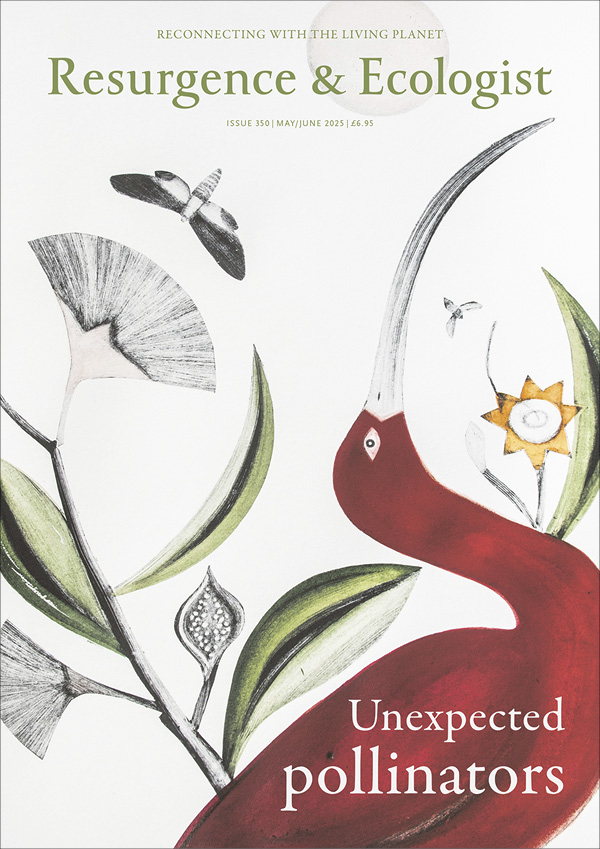In the way that queer theory recognises the importance of fluidity – particularly with regard to identity and sexuality as fluid and changeable phenomena, queer ecology challenges the mindset of ‘fixedness’ that upholds heterosexist notions of fixed identity, sexuality and gender roles.
It challenges western science’s rigid categorisation, reductionism with its implicit heterosexist assumptions, and problematic binaries, such as human/nature, natural/unnatural, rational/emotional, mind/body, male/female, wilderness/civilisation. Complexities of the world, reduced to simplistic opposites where one always has greater value.
Culture
This mode of thinking has long been used to denigrate expressions of human diversity as ‘against Nature’ or ‘unnatural’ and to legitimise the oppression of sexual and gender diversity in particular as well as other forms of diversity, and it doesn’t actually reflect the true nature of things. These are the shaky foundations conservation practice is firmly built upon.
Heteronormativity is the assumption that everyone is ‘naturally’ heterosexual, and that this is ‘normal’ and superior to homosexuality or bisexuality, which, by implication, must be unnatural and abnormal.
It also assumes a gender binary and that sexual/romantic relations should only be between these two genders – often with patriarchal undertones. It is inherently hierarchical, othering and prejudiced, though often unconscious.

Heteronormativity shows up in conservation in many ways. Conservation colludes with the erasure of homosexuality in the non-human world through focusing solely on heterosexual breeding pairs.
The internal culture of many conservation organisations reflects the wider dominant heteronormative culture we live in, with leadership and decisions being dominated by white, cisgendered, heterosexual men.
Decentre
The specific contributions that the queer community could make to help meet the biodiversity crisis are often overlooked, or at best tokenistic expressions of solidarity to garner more support.
Conservation operates on a power differential between human and non-human animals. Human intervention is guided by notions of value chosen by humans; values which often centre our needs and desires – whether this is an economic, ecological, or aesthetic value, or even the importance of Nature-connectedness for human wellbeing.
Within the patriarchal culture of the west and the binary view of Nature and gender, culture is masculinised and rooted in rationality and objectivity.
Intellect is valorised while feeling and intuition – seen to be animal and female – are devalued. This is used to justify control and domination of Nature, albeit under the guise of ‘nature conservation’.
A queer ecological approach would necessarily decentre humans and critically reassess power relations between humans and other beings, as well as acknowledge and support same-sex relations and gender diversity within human and non-human communities.
Forces
It would recognise and honour the agency, culture and feelings of nonhuman species. It would put into practice the queer ecology principles of embracing fluidity, change and complexity, and empower queer perspectives and leadership, valuing non-rational faculties in operations and organisations.
There is a fundamental conflict between queer fluidity and traditional conservation’s tendency to be limited to single-species-focused, control-based and outcome-driven approaches that aim to maintain – to ‘conserve’ – stasis.
This is where we begin to synergise with approaches such as rewilding, with its relinquishment of control and fixed outcomes, decentring of human agendas and clear challenge to the philosophies and practices of traditional conservation.
Rewilding, however, lacks a liberatory lens, which has led to some major conflicts amongst communities that have felt it to be imposed upon them by outside forces, with colonial undertones. Combining principles and practices between these approaches could be a worthwhile exploration.
Fruiting
Recent research in social psychology finds that the same psychological mechanisms that underlie racism, sexism and other forms of prejudice also give rise to speciesism.
People who express stronger generalised prejudice show greater indifference to the biodiversity crisis, greater enthusiasm for the exploitation of nature, and stronger resistance to action on climate change.
In other words, the nature crisis is a crisis of oppression, and any approach that is not explicitly anti-oppressive may not only be ineffective, but could even inadvertently work to strengthen generalised prejudice, making matters worse.
Ultimately a queer approach is also a decolonial, anti-racist, anti-capitalist, feminist, class equity approach. These perspectives, of course, all intertwine, like the mycelial network in a woodland, with fruiting bodies popping up in different places but ultimately rooted in enmeshment.
Fluid
Recognising that the nature crisis is fuelled by the drive to maintain domination by those with power and privilege, conservation must act in solidarity with communities marginalised by this domination.
These communities, many of whom are also reimagining human-nature relationships, must come together and act in solidarity. We have much in common, and we are stronger together.
In doing so we can liberate the wondrous unseen world of, as queer ecologist Bruce Bagemihl calls it, biological exuberance.
“The unspeakable inexplicability of Earth’s mysteries – which are as immediate as the next heartbeat … an affirmation of life’s vitality and infinite possibilities: a worldview that is at once primordial and futuristic, in which gender is kaleidoscopic, sexualities are multiple, and the categories of male and female are fluid and transmutable. A world, in short, exactly like the one we inhabit.”
This Author
Kara Moses is a queer freelance educator, conservation forester and facilitator of radical nature connection, working on an action research project exploring queering conservation, in collaboration with Common Cause Foundation. You can find out more at www.RewildEverything.org. This article first appeared in the Resurgence & Ecologist magazine.



No Comments
Leave a comment Cancel